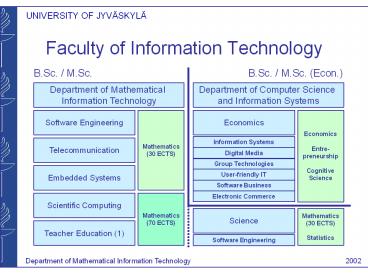Department of Mathematical Information Technology 2002 - PowerPoint PPT Presentation
Title:
Department of Mathematical Information Technology 2002
Description:
Department of Mathematical ... natural sciences and computer science we need teacher's professional ... Pure programming is discrete mathematics (structures) ... – PowerPoint PPT presentation
Number of Views:251
Avg rating:3.0/5.0
Title: Department of Mathematical Information Technology 2002
1
Faculty of Information Technology
B.Sc. / M.Sc.
B.Sc. / M.Sc. (Econ.)
Department of Mathematical Information Technology
Department of Computer Science and Information
Systems
Software Engineering
Economics
Mathematics (30 ECTS)
Economics Entre- preneurship Cognitive Science
Information Systems
Telecommunication
Digital Media
Group Technologies
Embedded Systems
User-friendly IT
Software Business
Electronic Commerce
Scientific Computing
Mathematics (70 ECTS)
Science
Mathematics (30 ECTS) Statistics
Teacher Education (1)
Software Engineering
2
Scientific computing
General Studies
Common Studies in the Major Subject
Mathematics
- Specified Studies in the Major Subject
- Numerical Methods
- Optimisation
- Modelling and Simulation
- Mathematical Algorithms
- Computer Graphics
3
Teacher Education in Computer Science
Study-line 1
Study-line 2
General Studies
Common Studies in the Major Subject
Studies in the Minor Subject Mathematics
Studies in the Minor Subject
Specified Studies in the Major Subject
Teacher's Pedagogics Studies
Business instructors and consultants
Comprehensive and Upper Secondary school
teachers
4
Role of Mathematics
- Pure programming is discrete mathematics
(structures) and logic! - Optimisation and Optimal Control are functional
analysis! - Computer Graphics is linear algebra!
- Modelling is PDE's and BVP's!
- has been, is and will be essential!
5
Development Strategy PPP
School
UJ A-Learning
Project N
What to teach? How to teach?
- learning theories
- human development
- cognition science
- pedagogics
- e-pedagogics
- teaching technology
Why to teach? To whom to teach?
Subject N
. . .
Project 2
. . .
Knowledge management ? Knowledge utilization
? Knowledge generation
Subject 2
Virtual environment
Project 1
Subject 1
Company
Research 1
Technology 1
structures
processes
Course 1
Project 1
semantics
communication
Research 2
Technology 2
knowledge acquisition
standards
Course 2
Project 2
. . .
. . .
. . .
. . .
Research N
Technology N
What to produce? How to produce?
Course N
Project N
Possibilities latest knowledge, context
liability new model for co-operation
Risks IPR, contracts, commitment, maintenance,
complexity, technology maturity
How to start prototypes in compact application
area
6
Development Strategy in practice Networking
- Summer courses for Upper Secondary School
students (Telecommunication, Functional
programming, Graphs and game theory, Multimedia
in Mathematics) - Basic studies of IT for selected schools (upper
secondary school, adult education open
university) available - Development of Upper Secondary School network
Multimedia-based study materials of mathematics
and physics from Stanford University (Kullervo
Nieminen) - Virtual University of Jyväskylä
- Agora Learning Laboratory
- MaDaMe research programme
7
Proposition
- To increase the qualification of teachers in
mathematics, natural sciences and computer
science we need teacher's professional licentiate
degree with necessary allocation of resources!

